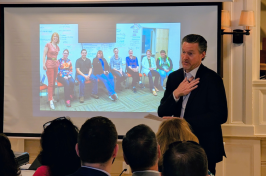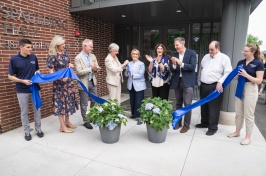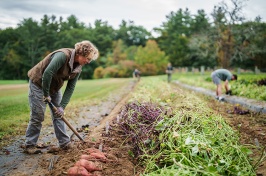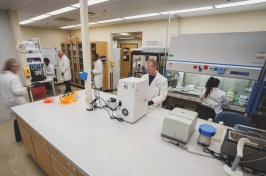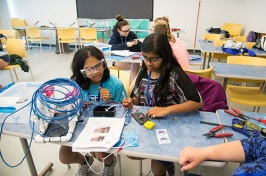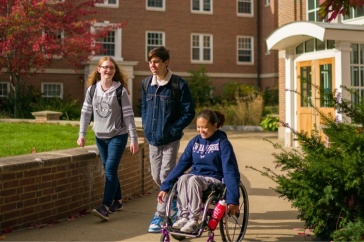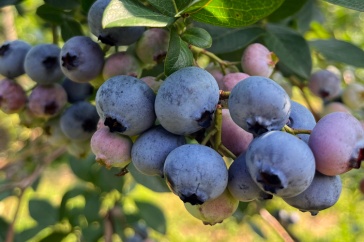
Jon Whitehouse, manager of the NHAES/UNH COLSA Fairchild Dairy Teaching and Research Center, gets a nuzzle from Leah the dairy cow as he stands with the Dairy One 2013 Quality Milk Award.
The Fairchild Dairy Teaching and Research Center, a facility of the NH Agricultural Experiment Station (NHAES) at the University of New Hampshire College of Life Sciences and Agriculture (COLSA), has been awarded a 2013 Quality Milk Award from the nationally recognized nonprofit dairy farmers cooperative Dairy One.
The Fairchild Dairy Center’s research herd was recognized for consistently producing milk with a low somatic cell count throughout the year. Dairy herds with a low somatic cell count tend to be more profitable herds since they have reduced treatment and veterinary costs for mastitis, which is the most common and costliest disease for dairy cattle, higher milk production per cow, and higher milk quality premiums. In addition, milk with lower somatic cell counts has a longer shelf life and results in a higher yield of cultured dairy products.
“Dairy herds that produce high quality milk with a low somatic cell count set a standard of excellence for the entire industry. At the Fairchild Dairy Center, the excellent herd management, careful milking procedures, and good milking equipment maintenance provided by our staff all contribute to producing healthy cows and high-quality milk,” said Jon Whitehouse, manager of the Fairchild Dairy Center.
“For more than 125 years, the NH Agricultural Experiment Station has been substantially contributing to the New Hampshire agricultural economy by conducting research that directly impacts the bottom line for our state’s farmers, producers, and growers. This latest quality milk award recognizes that our research dairy herd directly represents our long-time contributions to the Granite State,” said Jon Wraith, director of the NH Agricultural Experiment Station and dean of the UNH College of Life Sciences and Agriculture.
Celebrating its 25th year of operation this year, the Fairchild Dairy Center develops new knowledge and management expertise geared directly toward many state and regional stakeholders. It houses 87 milking-age Holstein and Jersey cows and approximately 70 growing, replacement animals. Included in that number is the 20-cow, student-managed Cooperative for Real Education in Agricultural Management (CREAM) herd, with the remaining animals devoted primarily to research in the area of dairy nutrition and reproductive biology. Cows at the Fairchild Dairy Center produce an average of about 26,000 to 27,000 pounds of milk per cow per year, which is greater than the national average of about 22,000 pounds per cow a year.
The Fairchild Dairy Center has been long recognized for its quality. In 2013 and 2012, the Fairchild Dairy Center received the Gold Quality Award from the Dairy Farmers of America. In 1999, the farm was cited as a Dairy of Distinction by the Milk Sanitation Board, which in 2000 awarded it a Certificate of Quality. In 1997 and 2004, the CREAM herd was recognized by Dairy One for having the highest quality milk (lowest somatic cell count) from among approximately 3,100 dairy herds on the official Northeast Dairy Herd Improvement Association (DHIA) test.
The Fairchild Dairy Center is located at 36 O’Kane Road off Mast Road Extension in Durham. It is open to the public seven days a week from 8 a.m. to 6 p.m. Visitors can observe the milking of cows at 3:30 p.m. each day. Map: http://www.colsa.unh.edu/nhaes/directions/Fairchild.
Dairy One is a farmer-owned cooperative nonprofit with a core DHIA membership of approximately 5,000 dairy farmer members throughout the Northeast and Mid-Atlantic region. Dairy One is closely aligned with Dairylea Cooperative and Dairy Farmers of America.
Founded in 1887, the NH Agricultural Experiment Station at the UNH College of Life Sciences and Agriculture is UNH’s original research center and an elemental component of New Hampshire's land-grant university heritage and mission. We steward federal and state funding to provide unbiased and objective research concerning diverse aspects of sustainable agriculture, aquaculture, forest management, and related wildlife and natural resources. We maintain the Woodman and Kingman agronomy and horticultural farms, the Macfarlane Greenhouses, the Fairchild Dairy Teaching and Research Center, and the Organic Dairy Research Farm. Additional properties also provide forage, forests and woodlands in direct support to research, teaching, and outreach.
-
Written By:
Lori Tyler Gula, PhD | NH Agricultural Experiment Station | lori.gula@unh.edu | 603-862-1452








